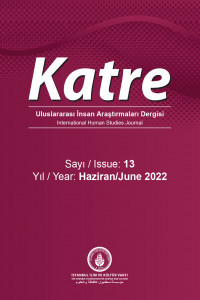THE MIRACLE OF PROPHET MUHAMMAD'S (PBUH) ASCENSION: A COMPARATIVE STUDY OF THE VIEWS OF BEDIUZZAMAN SAID NURSI AND DR. ALLAMA IQBAL
Ascension, Supreme Miracle, Sainthood, Prophetic Consciousness
___
- Afzaal, Ahmed. “Iqbal’s approach to the Quran.” Muhammad Iqbal A Contemporary 49, no.4 (2008) http://www.allamaiqbal.com/publications/journals/review/ oct08/2.htm#_edn2
- Iqbal, Muhammad. “A Plea for a Deeper Study of Muslim Scientists.” Islamic Culture3, no.2 (1929): 210-229.
- Iqbal, Muhammad, Kulliyat-i-Iqbal. Lahore: Iqbal Academy Pakistan, 2000.
- Iqbal, Muhammad. The Reconstruction of Religious Thought in Islam. Lahore: Iqbal Academy Pakistan, 1989.
- Jalalizade, Jalal. “A Comparison of the Thought of Bediuzzaman and Muhammad Iqbal.” In Third International Symposium on Bediuzzaman Said Nursi the Reconstruction of Islamic Thought in the Twentieth Century and Bediuzzaman Said Nursi. Istanbul: Sozler Publications, 1995. http://www.iikv.org/academy/index.php/sympeng/article/ view/908
- Khalil, Imaduddin. “God’s Messenger (pbuh) in The Risale-I Nur.” In Third International Symposium on Bediuzzaman Said Nursi the Reconstruction of Islamic Thought in the Twentieth Century and Bediuzzaman Said Nursi. Istanbul: Sozler Publications, 1995. http://www.iikv.org/academy/index.php/sympeng/article/view/887
- Riaz, Muhammad.“Glimpses of Iqbal’s Gennius in the Javid Namah.” Iqbal Review18, no.4 (1978), 171-182.
- Sherwani, Latif Ahmed. Speeches, Writings, and Statements of Iqbal. Lahore: Iqbal Academy, 1977.
- Sil’u ,Yusuf Muhammad Eid. “The Wisdom of Prophethood and its Neccessity.” The Pen, Nov 24, 2012. http://www.thepenmagazine.net/the-wisdom-of-prophethood-and-its-necessity/
- Markham, Ian & Birinci, Suendam. An Introduction to Said Nursi, Life, Thought and Writings.UK: Ashgate Publishing Ltd, 2011. Mohammad, Yasien. “Predestination and Free Will in the view of Iqbal and Nursi.” In International Symposium on Bediuzzaman Said Nursi The Qur’anic View of Man, According to the Risale-I Nur. Istanbul: Sozler, 2000. http://www.iikv.org/ academy/index.php/sympeng/article/view/1003
- Nursi, Bediuzzaman, Said. The Letters. Translated by Sukran Vahide. Istanbul:- Sozler Nesriyat, 2010.
- Nursi, Bediuzzaman, Said. The Words. Translated by Sukran Vahide. Istanbul: Sozler Nesriyat, 2008.
- Vahide, Sukran. “Bediuzzaman Said Nursi and the Risale-i Nur.” In Globalization, Ethics and Islam: The Case of Bediuzzaman Said Nursi, edited by Ian Markham and Ibrahim Ozdemir. England: Ashgate, 2005.
- Vahide, Sukran. Islam in Modern Turkey An Intellectual Biography of Bediuzzaman Said Nursi. Albany: State University of New York Press, 2005.
- Zaman, S.M. “Iqbal and The Fundamentals of Islam.” Iqbal Review 36, no.3 (1995): 105-113.
- ISSN: 2146-8117
- Yayın Aralığı: Yılda 2 Sayı
- Başlangıç: 2016
- Yayıncı: İstanbul İlim ve Kültür Vakfı
Said Nursi’nin Dingin Fert ve Toplumun Oluşumuna Dair Analiz ve İctihat-larının Değerlendirilmesi
BEDİÜZZAMAN SAİD NURSİ'YE GÖRE HUKUKTA ADALET ÇEŞİTLERİ
KUR'AN İLİMLERİ VE TEFSİR METODOLOJİSİ AÇISINDAN RİSALE-İ NUR
Risale-i Nur Işığında Ümit ve Ümitsizlik
BEDİÜZZAMAN SAİD NURSİ'NİN TEFSİRİNİN DEĞERİ
EL-ADİL İSM-İ İLAHİSİ: RİSALE-İ NUR'DA ADALET KAVRAMI VE ONTOLOJİSİ
